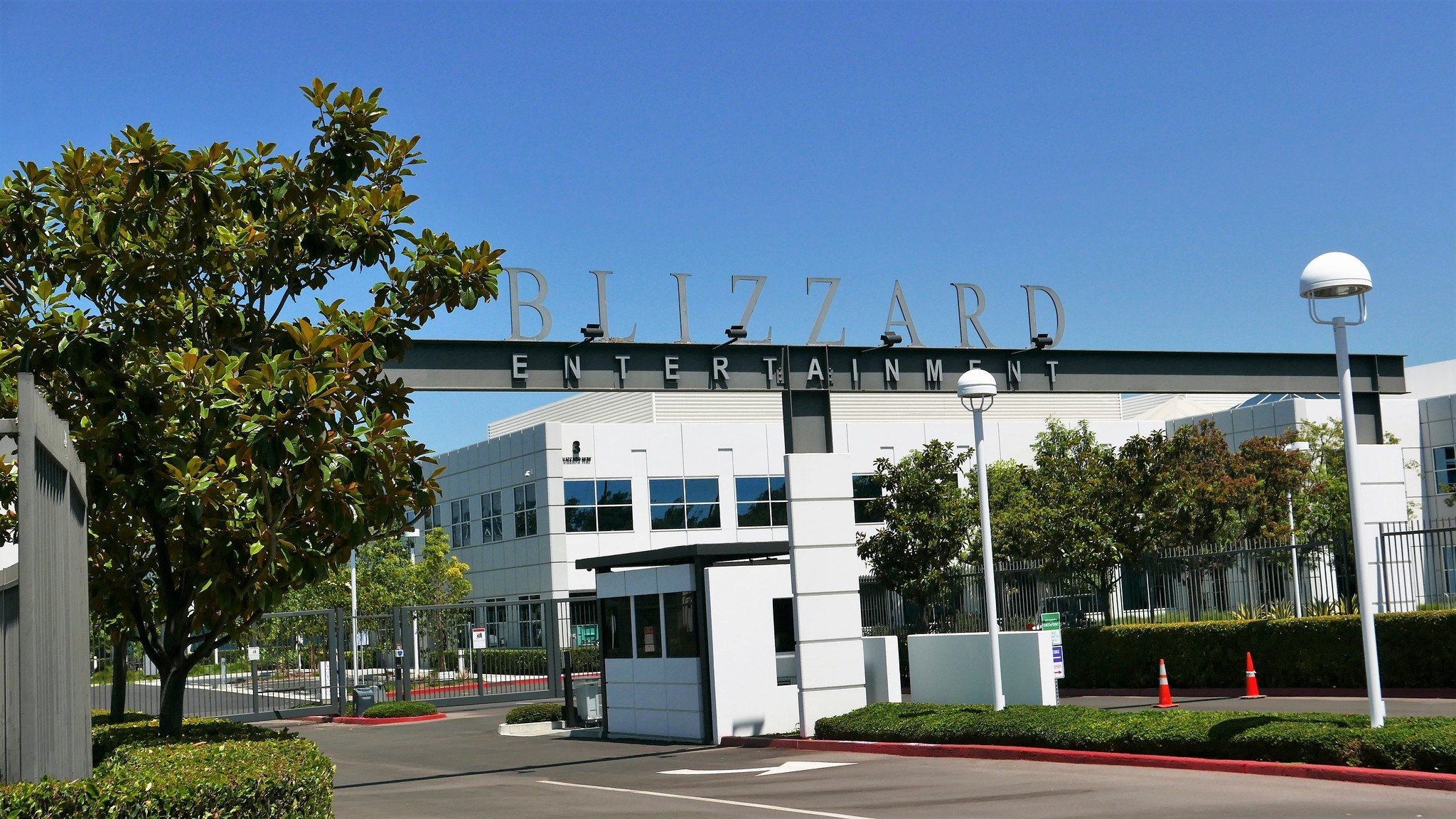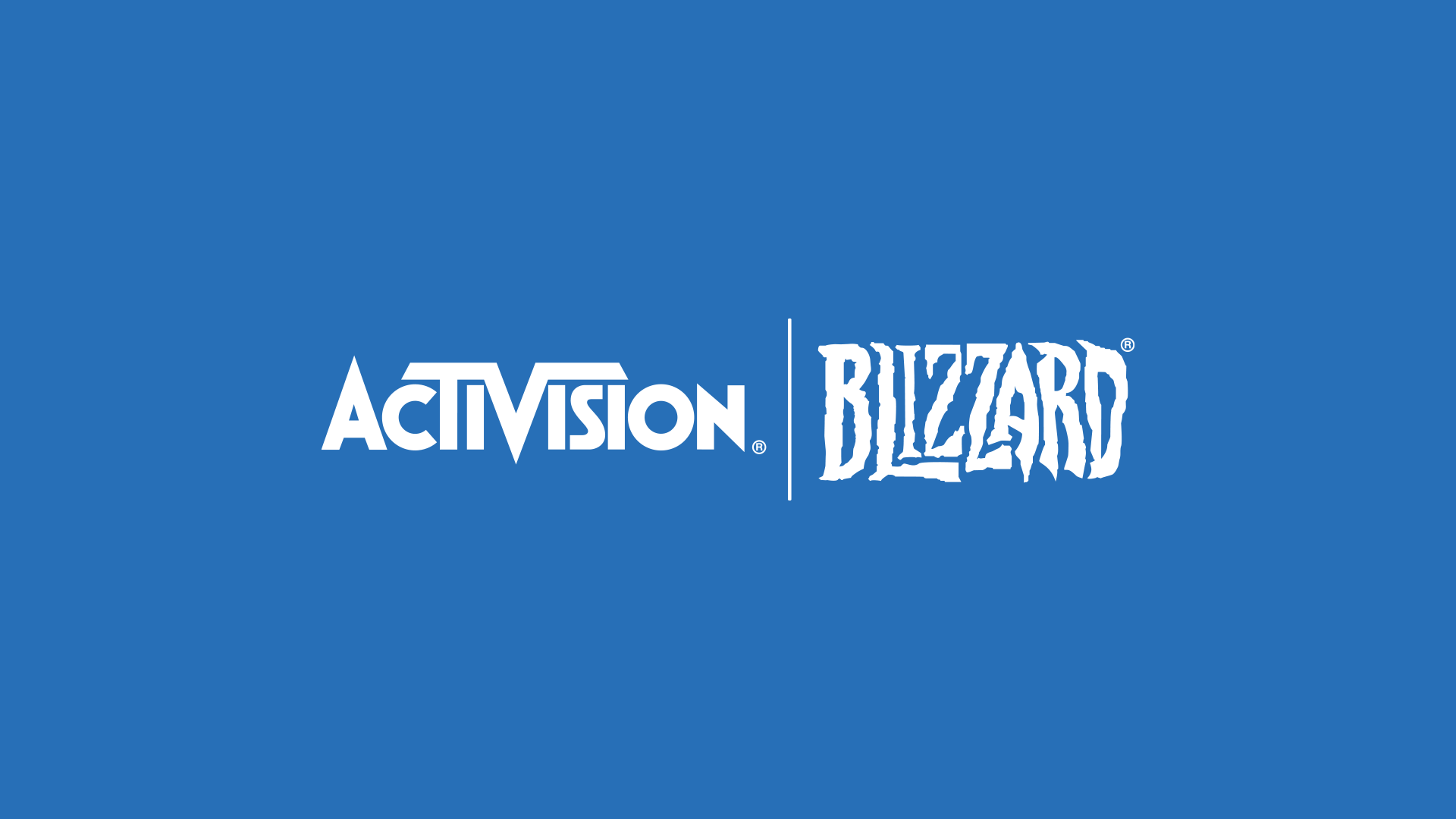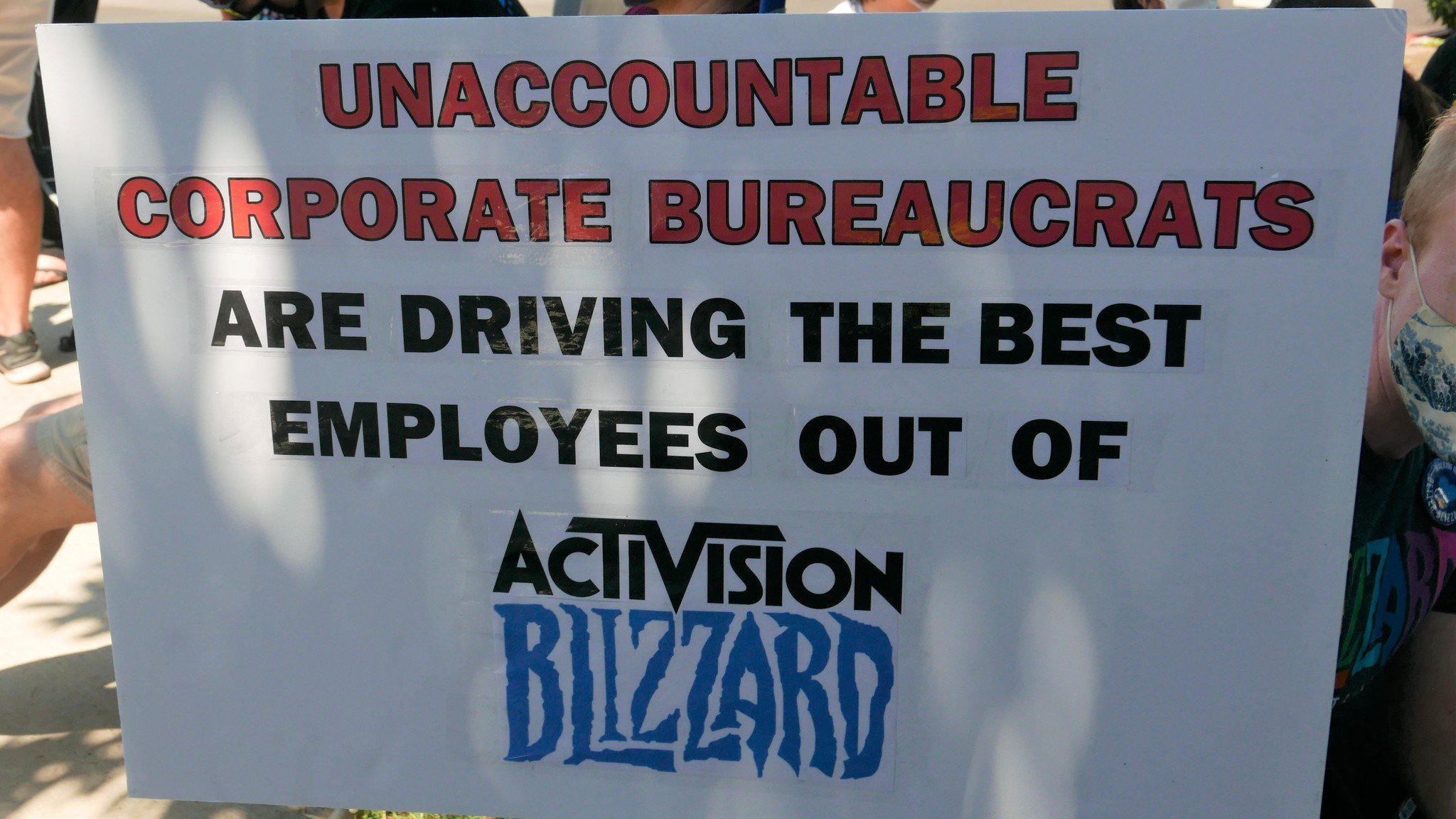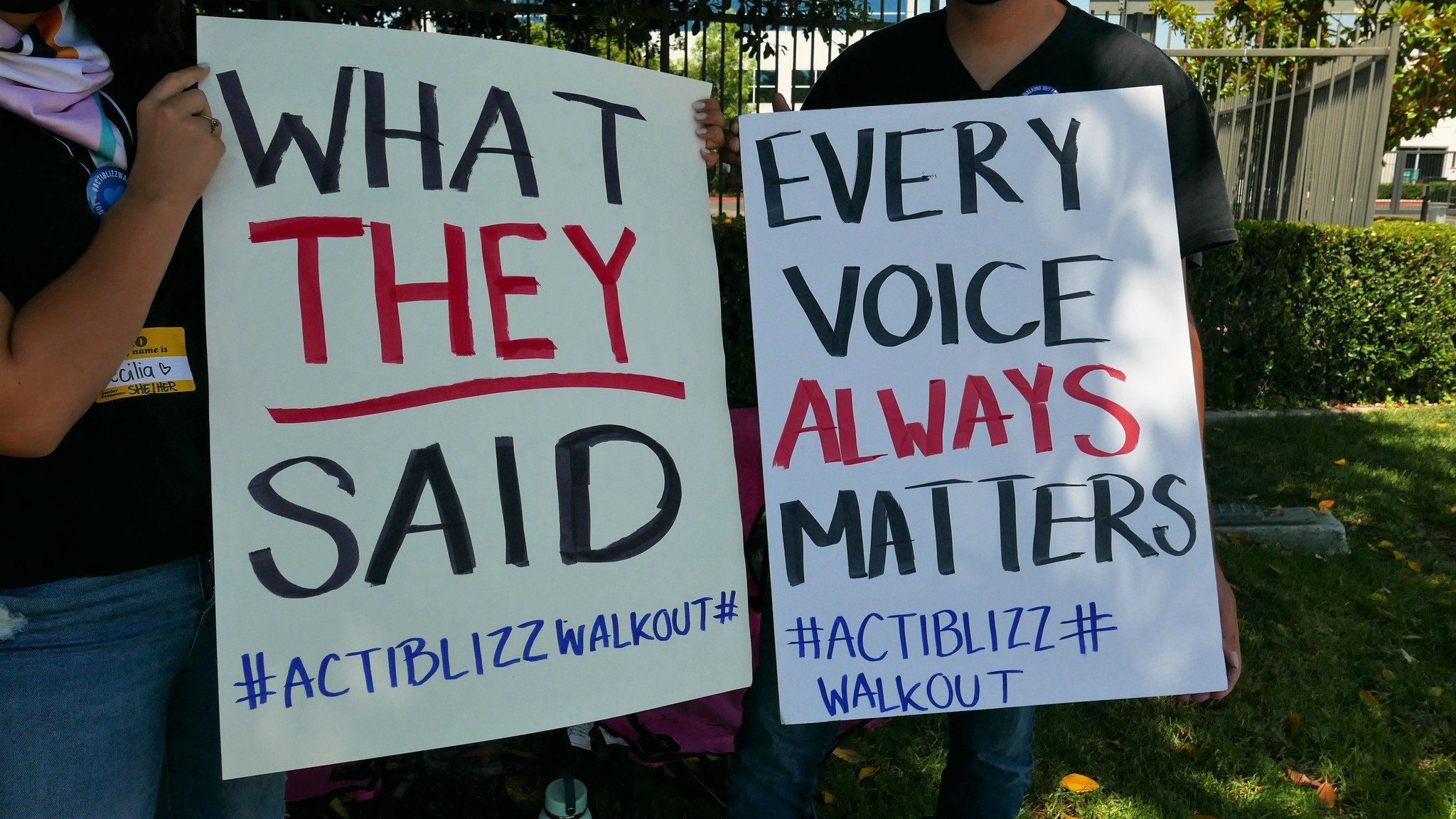Get caught up on the latest happenings from the biggest story in the video games industry right now.
In July, a firestorm kicked off within the video game industry. Activision Blizzard became the center of the news cycle following a lawsuit filed in California courts accusing the company of creating a "frat boy" culture where women are victims of harassment, unfair pay, and retaliation. The lawsuit went into great detail about alleged past events and called for numerous forms of relief, including compensation and punitive damages.
Since the lawsuit went public, the company has responded with a statement from CEO Bobby Kotick about plans to begin rectifying company culture and a huge walkout from employees. We expect the situation to continue into the foreseeable future, but what's happened so far? Here's everything you need to know about the Activision Blizzard lawsuit and what's happened since.
What is the Activision Blizzard lawsuit?
The California Department of Fair Employment and Housing (DFEH) brought forward the civil lawsuit against the game publisher on July 20, 2021. The crux of the suit, which came after a two-year investigation, alleges that the company had created a "frat boy" culture where female employees were subjected to pay disparities, sexual harassment, and retaliation when they came forward.
The suit claims that the DFEH attempted to contact Activision Blizzard about the allegations prior to filing. However, the "parties were unable to resolve the administrative complaints." The DFEH also said in the court documents that efforts to mediate were made, but they were unsuccessful.
Overall, the DFEH said those affected suffered lost compensation and emotional pain. The DFEH is seeking relief for all the affected female employees, including punitive damages and unpaid wages.
What claims are present in the lawsuit?
The suit begins with the claim that the company is only staffed by around 20% women and that "few women ever reach top roles at the company." Even when they do, they earn a smaller salary than their male counterparts and are offered fewer stock and incentive pay opportunities.
The suit begins with the claim that the company is only staffed by around 20% women.
"Women were steered into the lower levels of Defendants' hierarchy and often had to work harder and longer to earn equal promotional and other opportunities as their male counterparts," the suit said.
Either way, female employees report generally getting paid less than male employees who perform the same kinds of work. Similarly, the court documents state that male employees would get away with coming into work hungover and playing video games while delegating their work to female employees. They would also get opportunities that their female employees were not privy to.
In one example, a female employee reported that one of her male counterparts was invited to weekly meetings with a VP when she was not afforded the same privilege, even after receiving great performance reviews and generated more money in her marketing campaigns.
Sexual harassment was also rampant across the company. The suit lists several examples, including the pervasiveness of "cube crawls," where male employees would drift from cubicle to cubicle harassing other employees. World of Warcraft female employees reported that male employees would make rape jokes and other inappropriate comments.
One person named in the lawsuit was Alex Afrasiabi, who was formerly the senior creative director on World of Warcraft. Employees alleged that he engaged in inappropriate behavior at BlizzCon, and it was apparently so well known that his suite was nicknamed the "Cosby Suite."
The company's culture particularly targeted women of color. For example, one Black employee stated that she was micromanaged by her supervisor, who made her write a summary of what she would do on her time off, which was not department policy.
The suit also claims that pregnancy discrimination occurred at the company. For example, one woman said that she was denied a promotion because "they could not risk promoting her as she might get pregnant and like being a mom too much." Breastfeeding rooms were also used for meetings instead of their intended use, and employees using the room were kicked out.
In one particularly heartbreaking example, a female employee died by suicide on a business trip after sexual harassment.
What have the responses been from leadership?
Activision Blizzard's initial response to the lawsuit wasn't kind to the DFEH, calling a lot of the claims "distorted, and in many cases, false."
"We value diversity and strive to foster a workplace that offers inclusivity for everyone. There is no place in our company or industry, or any industry, for sexual misconduct or harassment of any kind," a spokesperson for Activision Blizzard told Bloomberg Law in a statement. "We take every allegation seriously and investigate all claims. In cases related to misconduct, action was taken to address the issue."
Other responses from company leadership have been mixed. Former Blizzard President J. Allen Brack, who is named in the lawsuit, called the allegations "extremely troubling" in an internal email.
"I feel angry, sad, and a host of other emotions, but I also feel grateful to work alongside a set of leaders and thousands of employees who join me in their commitment to continuous improvement," he continued, saying that leadership would be meeting with employees to discuss how to move forward.
On the other hand, Executive Vice President of Corporate Affairs Frances Townsend echoed the original company statement in her internal email. She said the lawsuit "presented a distorted and untrue picture of our company, including factually incorrect, old, and out of context stories — some from more than a decade ago."
Meanwhile, CEO Bobby Kotick published a statement saying that the original Activision Blizzard response was "tone deaf."
"It is imperative that we acknowledge all perspectives and experiences and respect the feelings of those who have been mistreated in any way. I am sorry that we did not provide the right empathy and understanding," Kotick wrote.
What has happened since the lawsuit?
As expected from a lawsuit this large, a lot has happened since it was filed, both inside and outside the company.
Development reportedly halts on World of Warcraft
Jeff Hamilton, a senior developer on World of Warcraft, wrote in a series of tweets following the lawsuit report that "almost no work is being done on World of Warcraft right now while this obscenity plays out.
"Activision's response to this is currently taking a group of world-class developers and making them so mad and traumatized they're rendered unable to keep making a great game," he wrote.
Warcraft team removes inappropriate references from the game
A message from the #Warcraft team. pic.twitter.com/3gWCz1gu8T
— World of Warcraft (@Warcraft) July 27, 2021
On July 27, the World of Warcraft team released a statement, noting that they had taken note of player feedback and would be removing inappropriate references from both Shadowlands and WoW Classic. Wowhead reported that this includes references to former creative director Alex Afrasiabi. Most notably, Field Marshal Afrasiabi was replaced by Field Marshal Stonebridge, among other changes.
Activision Blizzard employees participate in a walkout
In response to the lawsuit, employees within the company organized a walkout on July 28, 2021. Hundreds of employees walked out on the job, many standing in protest in front of Blizzard Entertainment headquarters. The point was to bring attention to four demands:
- An end to mandatory arbitration clauses in all employee contracts, current and future. Arbitration clauses protect abusers and limit the ability of victims to seek restitution.
- The adoption of recruiting, interviewing, hiring, and promotion policies designed to improve representation among employees at all levels, agreed upon by employees in a company-wide Diversity, Equity & Inclusion organization. Current practices have led to women, in particular women of color and transgender women, nonbinary people, and other marginalized groups that are vulnerable to gender discrimination not being hired fairly for new roles when compared to men.
- Publication of data on relative compensation (including equity grants and profit sharing), promotion rates, and salary ranges for employees of all genders and ethnicities at the company. Current practices have led to aforementioned groups not being paid or promoted fairly.
- Empower a company-wide Diversity, Equity, & Inclusion task force to hire a third party to audit ABK's reporting structure, HR department, and executive staff. It is imperative to identify how current systems have failed to prevent employee harassment, and to propose new solutions to address these issues.
At the time of this writing, leadership hasn't responded yet to the demands.
The industry responds
On the day of the walkout, around 500 current and former Ubisoft employees signed an open letter standing in solidarity with the walkout participants and calling for collaboration between Ubisoft, Activision Blizzard, and other companies.
"We believe you, we stand with you and support you," the letter said.
Ubisoft had been embroiled in controversy of its own back in 2020. Multiple high-level executives were either fired or left the company following allegations of a toxic workplace environment and harassment. The open letter states that not enough has been done internally to deal with a lot of the issues.
"We have stood by and watched as you fired only the most public offenders. You let the rest either resign or worse, promoted them, moved them from studio to studio, team to team, giving them second chance after second chance with no repercussions. This cycle needs to stop," the letter continued.
Meanwhile, Jeff Strain, a former senior Blizzard employee who worked on StarCraft and Diablo and co-founder of ArenaNet and Undead Labs, wrote a letter to his employees giving them his endorsement to unionize. The letter, which was published in full by IGN, notes the number of awful stories he's heard while being in the industry and that the lawsuit left him "disgusted and repulsed — but not at all surprised."
"I welcome my employees to unionize, and I'm giving my full endorsement and support to an industry wide adoption of unions," he wrote. "I also encourage the leadership of game-industry companies, large and small, corporate and independent, to join me in endorsing and advocating for unionization as a concrete, actionable step toward improving our industry."
More reports emerge
Following the walkout, numerous outlets published reports expanding on the initial allegations in the lawsuit and stating new ones.
On July 28, Kotaku published an in-depth look into the Cosby Suite named in the lawsuit. The room was reportedly a place filled with booze where people could go for parties. In addition, it featured a large portrait of Bill Cosby, who was accused of sexual assault by numerous women and was convicted in 2018 for aggravated indecent assault (although that conviction was overturned this year).
On July 29, The New York Times published its investigation into the lawsuit and subsequent walkout. One former employee interviewed for the article said that she was paid less than a former boyfriend, who joined the company at the same time and performed similar tasks. She also said that she denied drugs from her manager, which she alleges hurt her career.
"It is absolutely a rock-star mentality, and it touched almost every aspect of Blizzard culture."
Many reports emerged on July 30. One from IGN affirmed a lot of what had been alleged of the drinking culture at the company, but also went deeper into how women, specifically pregnant women and breastfeeding mothers, were treated. One source noted how men would often walk into the breastfeeding room and stare at the women using it. Another person told IGN that they had trouble getting time off to go to the doctor as a pregnant woman. While a lot had been done to cut down on the company's drinking culture, many sources noted that it hadn't been enough, saying what was done was akin to "putting lipstick" on the problem.
Vice resurfaced a story from 2018 where a former Activision Blizzard IT worker was arrested after putting cameras in the company's Minnesota office bathroom with the intent to spy on workers. It also published a story concerning a woman who had an indecent encounter with Blizzard employees at the Black Hat cybersecurity conference in 2015. She said, "One of them asked me when was the last time I was personally penetrated, if I liked being penetrated, and how often I got penetrated."
On Aug. 6, Waypoint continued its reporting with an article concerning Blizzard's chief information officer, Derek Ingalls, and how he joked about sleeping with female assistants during a meeting. Bloomberg also published an in-depth piece on what the culture was like in the years leading up to the lawsuit, and how a predominantly male workforce affected egos and workplace behavior. Many of its developers were treated like rock stars.
"It is absolutely a rock-star mentality, and it touched almost every aspect of Blizzard culture," Christina Mikkonen, a former employee, told Bloomberg. "These developers were untouchable. Not only could they tell you how to do your job, but they had so much power, they could do whatever they want in line of sight with their other powerful friends."
Leadership steps down
On Aug. 3, 2021, Blizzard president J. Allen Brack stepped down from the company. Jen Oneal, previously the head of Vicarious Visions and executive vice president of development at Blizzard, and Mike Ybarra, who's most known for working at Xbox before joining Activision Blizzard in 2019, will co-lead the studio moving forward. Brack was one of the names brought up in the lawsuit.
The same day, Bloomberg reported that Jesse Meschuk, the company's top HR executive, has also left the company.
Sponsorships pulled
Esports leagues are funded in part by corporate sponsorships, and that includes entities like the Overwatch League and the Call of Duty League. This week, Coca-Cola, Kellogg, State Farm, and T-Mobile were all reassessing their partnerships with Activision Blizzard's Overwatch Leagaue, according to the Washington Post. Later this week, Kellogg confirmed it would no longer advertise Cheez-It or Pringles in the Overwatch League. T-Mobile also noted it would be pausing its sponorship.
What's next for Activision Blizzard and the lawsuit?
We can't say for sure what will happen with the company going forward, but we can make some predictions based on similar past events and statements from leadership.
It's unlikely that the case will go to trial. A lot of DFEH cases end in a settlement, so this case will probably end in one as well. More importantly, we can expect Activision Blizzard to introduce big changes to the company to counter the allegations. So far, the company hasn't responded to the walkout organizers' demands, nor has it released a concrete plan to address the allegations.
However, based on company leadership's statements and internal emails, we can expect an overview of hiring practices, or at least a statement breaking down how the company will do so. Kotick noted in his statement that he wants to work with hiring managers to ensure "they have diverse candidate slates for all open positions" and to evaluate managers and other leaders and to terminate those who "impeded the integrity of our processes." Activision Blizzard has also hired a third-party law firm, WilmerHale, to review company policies. (It's worth noting, as pointed out by Kotaku, that this is the same firm that Amazon is using to prevent workers from unionizing.) Multiple execs have mentioned wanting to hold discussions with current employees to get feedback. According to an Uppercut Crit article, a source mentioned that "any future all hands style meetings have been tabled in favor of smaller group 'discussion sessions.'"
Inappropriate content will also be removed from games. So far, this mostly refers to Afrasiabi references, but we're sure to see other changes moving forward. Like with Ubisoft, we'll likely see an exodus of people in higher positions.
Don't expect the company to unionize. Organizers told Windows Central that unionization isn't on the table at this time. They hope to mostly work with company leadership to fix the systemic problems named in the lawsuit and continue evolving their demands based on the responses. They also noted that they expect to work with leadership no matter how long it takes to make sure demands are met.
Updated Aug. 6, 2021: Added section about companies pulling sponorships, along with articles published on Aug. 6.














0 comments:
Post a Comment